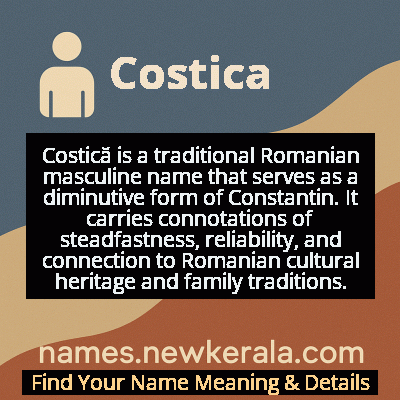Costica Name Meaning & Details
Origin, Popularity, Numerology Analysis & Name Meaning of Costica
Discover the origin, meaning, and cultural significance of the name COSTICA. Delve into its historical roots and explore the lasting impact it has had on communities and traditions.
Name
Costica
Gender
Male
Origin
Romanian
Lucky Number
7
Meaning of the Name - Costica
Costică is a traditional Romanian masculine name that serves as a diminutive form of Constantin. It carries connotations of steadfastness, reliability, and connection to Romanian cultural heritage and family traditions.
Costica - Complete Numerology Analysis
Your Numerology Number
Based on Pythagorean Numerology System
Ruling Planet
Neptune (Ketu)
Positive Nature
Intuitive, analytical, spiritual, and inquisitive.
Negative Traits
Secretive, reserved, aloof, and can be overly critical.
Lucky Colours
Green, yellow.
Lucky Days
Monday.
Lucky Stones
Cat’s eye, moonstone.
Harmony Numbers
1, 5, 6.
Best Suited Professions
Scientists, researchers, spiritual leaders, detectives.
What People Like About You
Depth of knowledge, analytical skills, spirituality.
Famous People Named Costica
Costică Ștefănescu
Footballer and Coach
Legendary Romanian footballer and successful coach who won multiple championships with Steaua București
Costică Acsinte
Military Photographer
Renowned Romanian photographer who documented rural life and created an extensive archive of historical images
Costică Dafinoiu
Composer and Musician
Influential Romanian composer known for his contributions to contemporary classical music and film scores
Name Variations & International Equivalents
Click on blue names to explore their detailed meanings. Gray names with will be available soon.
Cultural & Historical Significance
Throughout Romanian history, Costică has been a name associated with the common people—the farmers, craftsmen, and workers who formed the backbone of Romanian society. It appears frequently in folk tales, jokes, and oral traditions as a character who embodies practical wisdom, cleverness, and moral integrity. During the communist era, the name maintained its popularity as a symbol of cultural resistance and connection to pre-communist Romanian identity. In contemporary times, while its usage has declined, it remains a powerful symbol of authenticity and cultural continuity, representing the enduring qualities that Romanians value: reliability, tradition, and connection to one's roots.
Extended Personality Analysis
Individuals bearing the name Costică are typically characterized by their steadfast nature and deep-rooted connection to tradition and family. They exhibit a remarkable consistency in their behavior and values, making them reliable partners, friends, and community members. Their personality is marked by a practical wisdom that comes from observing life carefully and learning from experience rather than formal education. Costicăs often serve as stabilizing forces in their social circles, providing calm guidance during turbulent times.
These individuals tend to approach life with patience and methodical planning, preferring gradual, sustainable progress over quick but unstable achievements. They possess a strong sense of loyalty and will stand by their commitments through challenges and difficulties. While sometimes perceived as conservative or resistant to change, this often stems from their deep understanding of what has proven valuable over time. Their strength lies in their ability to balance tradition with practicality, drawing on accumulated wisdom while remaining grounded in present realities. Costicăs typically excel in roles that require consistency, reliability, and long-term perspective, making them valued members of any community or organization.
Modern Usage & Popularity
In modern Romania, the name Costică has transitioned from being a common first name to occupying a more niche position in the naming landscape. While it has declined in popularity among urban, younger parents who often prefer more contemporary or international names, it maintains a strong presence in rural communities and among families with strong traditional values. The name has experienced a modest revival in recent years as part of a broader cultural movement that seeks to reconnect with Romanian heritage and preserve linguistic traditions. Current usage patterns show Costică being employed more frequently as a middle name or as an affectionate family nickname rather than as a formal given name. It remains particularly popular in regions with strong traditional ties, such as rural Moldova and parts of Transylvania, where it continues to serve as a link to family history and cultural identity. The name's current trajectory suggests it will likely persist as a cultural touchstone rather than regaining widespread popularity.
Symbolic & Spiritual Meanings
Symbolically, Costică represents the enduring qualities of constancy, reliability, and cultural continuity. It embodies the metaphorical strength of ancient oak trees—deeply rooted, patient in growth, and resilient through changing seasons. The name carries connotations of traditional wisdom that has been tested by time and proven valuable across generations. It symbolizes the bridge between ancestral heritage and contemporary life, serving as a living connection to cultural memory and collective experience.
Metaphorically, Costică represents the quiet dignity of ordinary people who maintain cultural traditions and family values despite external pressures and changing social landscapes. It evokes images of skilled craftsmen whose work improves with time and experience, and farmers who understand the rhythms of nature and the importance of patience. The name also symbolizes emotional groundedness and the ability to remain steady during life's challenges, much like the Carpathian mountains that have watched over Romanian lands for millennia. In a broader sense, Costică represents the idea that true strength often lies not in dramatic displays but in consistent, reliable presence and the quiet accumulation of wisdom through lived experience.

